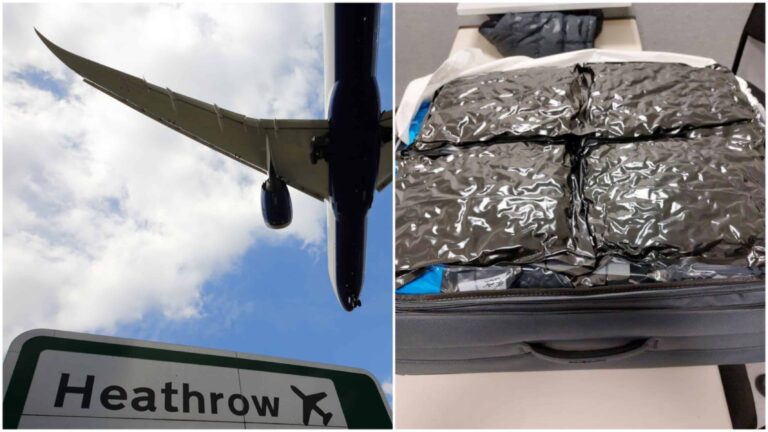The United Kingdom’s National Crime Agency revealed on Tuesday that a total of nine Americans have been arrested in the span of one week for attempting to smuggle cannabis into the island nation. The law enforcement agency is now investigating to determine if there is a link between the failed attempts to illegally import marijuana from California to the U.K.
The National Crime Agency (NCA) noted that nine individuals, all United States nationals, have been arrested since last week while trying to carry cannabis from Los Angeles International Airport (LAX) to London’s Heathrow Airport. All of those arrested have been charged with carrying between 30 and 50 kilograms (about 56 to 110 pounds) of cannabis in their checked baggage.
“We are working to understand how these seizures are connected, however to get this many off the same route in such a short period of time is clearly very unusual,” NCA senior investigation officer Darren Barr said in a statement from the agency.

9 Pot Seizures In One Week
The first seizure was made on Tuesday, January 10, when a passenger arriving at Heathrow from LAX was arrested after the Border Force found about 30 kilos of cannabis in the traveler’s luggage. Three days later, another seizure was made on Friday, followed by an additional two interdictions on Saturday. Cannabis from LAX was seized at Heathrow four more times on Sunday, while the most recent smuggling attempt to be thwarted occurred on Monday, January 16.
In all, about 340 kilograms (nearly 750 pounds) of marijuana were seized in the nine seizures at Heathrow over the week. All nine American nationals arrested have been charged with attempting to import class B drugs into the country and have been remanded into custody pending appearances in court.
Officials estimated the street value of the “herbal cannabis” at more than £5.5 million, or about $6.8 million, although law enforcement agencies have been known to make inflated estimates of the value of seized drugs.
The NCA official warned that the suspects charged in the smuggling cases face steep penalties if they are found guilty. Convictions for importing class B drugs into the U.K. can carry unlimited fines and prison sentences of up to 14 years.
“Drugs couriers face stiff sentences so I’d urge anyone considering getting involved in such ventures to think very carefully about the consequences,” Barr noted. “Alongside partners like Border Force we are determined to do all we can to disrupt the organized crime groups involved in international drug trafficking.”
Steve Dann, the chief operating officer of the Border Force, praised the work of customs officials for their role in preventing the seized cannabis from entering the country.
“Drugs fuel violence and chaos on the streets and inflict suffering in communities across the U.K. Thanks to the work by Border Force, these dangerous drugs were stopped from reaching Britain’s streets and causing significant harm to our neighborhoods,” said Dann. “This seizure demonstrates the successful joint partnership between the Border Force and NCA, as well as our common commitment to keep our communities safe and smash the illegal drugs trade.”

U.K. Cannabis Policy Under Debate
The marijuana seizures at Heathrow Airport come as government officials engage in a renewed debate over cannabis policy in the U.K. In July of last year, then-Home Secretary Priti Patel announced proposed new sanctions on users of cannabis and other drugs that include the confiscation of driver’s licenses and passports under a new three-strikes policy for illicit drug use.
“Drugs are a scourge across society. They devastate lives and tear communities apart,” Patel said in a statement from the government. “Drug misuse puts lives at risk, fuels criminality and serious and violent crime and also results in the grotesque exploitation of young, vulnerable people.”
Under the proposal, which was detailed in a white paper drafted by the Home Office, those caught with illegal recreational drugs would face fines and mandatory drug education. They could also be banned from nightclubs and other entertainment venues.
Three months later, U.K. Home Secretary Suella Braverman revealed that she was considering tightening the classification of cannabis under the nation’s drug laws over concerns that marijuana is a gateway drug and can lead to serious health problems. Braverman’s review followed calls from law enforcement leaders to reclassify cannabis as a Class A drug, the same category assigned to substances including heroin, cocaine, and ecstasy.
But then last month, a group of police chiefs in the United Kingdom announced a plan to effectively decriminalize the possession of drugs including cannabis and cocaine. If adopted by the government, the use and possession of small amounts of recreational drugs would be treated as a public health issue for first-time offenders, rather than a criminal offense subject to prosecution and jail time or other punishment.
The proposals, which were developed by the National Police Chiefs’ Council (NPCC) and the College of Policing, would effectively decriminalize the possession of Class A drugs including cocaine and Class B substances such as marijuana. Under the plan, individuals caught with illegal drugs would be offered an opportunity to attend drug education or treatment programs, rather than being subjected to prosecution.
